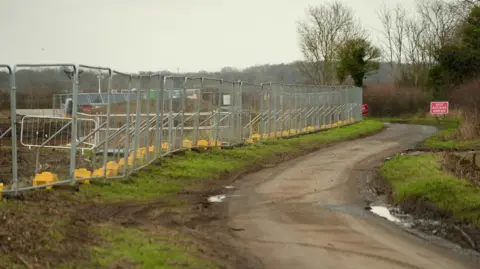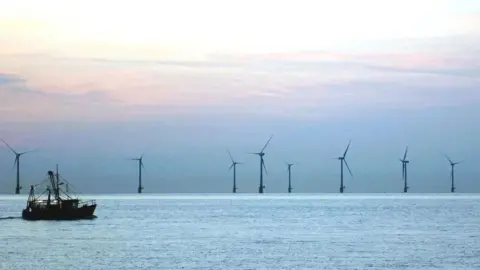End 'whack-a-mole' energy projects strategy - MP
 Vikki Irwin/BBC
Vikki Irwin/BBCAn MP has called for an end to what she called a "whack-a-mole strategy" for energy projects in the East of England.
Jenny Riddell-Carpenter, Labour MP for Suffolk Coastal, said a "void of no leadership" meant major infrastructure projects on Suffolk's coast were not coordinated, leading to "applications being drawn up without community interests at their heart".
The Sizewell C nuclear power station, infrastructure to support offshore wind farms and National Grid projects are all planned for the county's coast.
A government spokesperson said it was "reforming our planning system to ensure an effective, strategic approach for new energy projects".
Speaking on BBC Radio Suffolk, Riddell-Carpenter said: "Thirty per cent of the UK's energy is due to be created or transported through Suffolk's coastline and that's a significant amount of energy infrastructure that's either planned, being constructed now or intended to come here."
Both Sizewell C and ScottishPower Renewables' offshore windfarms were given approval in 2022, when the Conservatives were in power.
"In creating that void of no leadership, organisations stepped in and they could just carve it up, pop this here, pop that there and it was a whack-a-mole strategy that was just left up to the energy developers to pursue and sustain," she said.
"In no way is that good enough; in no way is that sufficient."
She gave the example of the Nautilus project, plans for an under sea cable between Belgium and the UK.
Suffolk's coast was being considered by National Grid as a location for landfall for the cable, but this has now moved to Kent.
Riddell-Carpenter said: "Suddenly it was off the cards - it left just as suddenly as it came - but this is not how policy should be developed or conceived."
 Martin Giles/BBC
Martin Giles/BBCShe said she was pulling together a Suffolk Coastal Energy task force, including parish councillors, community leaders and representatives from the energy developers, to better co-ordinate plans.
However, energy firms dispute the alleged lack of coordination.
A spokesperson for National Grid said: "The application for our Sea Link project has not yet been submitted.
"We have been consulting local communities in East Suffolk for the last three years, including local political representatives, all with the aim of identifying ways to keep disruption from construction to a minimum.
"We are already coordinating with the other projects in the area, and attend community-facing meetings like the Sizewell C Community Forum - which the local MP is invited to."
 PA Media
PA MediaJulia Pyke, joint managing director of Sizewell C, said: "Low-carbon energy projects offer this area a huge opportunity for jobs, for investment, and for growth.
"But projects do need to talk to each other; we do need to set an example of how infrastructure can be done better in this region.
"We're working very closely with local projects and councils, to share intelligence and coordinate so that we can reduce impacts on local people."
A spokesperson for ScottishPower Renewables said it prided itself on being "a responsible developer" and "considerate constructor".
"Our East Anglia offshore windfarm projects, which are all fully consented, are multi-billion pound investment projects," they said.
"Our focus is always on minimising impact – for example, installing all the cable route ducting for one windfarm during the construction of another – while maximising benefits for our communities."
A spokesperson for the Department for Energy Security and Net Zero said: "Securing Britain's clean energy future requires improving infrastructure in a cost-effective way to get renewable electricity on the grid and protect billpayers from unstable fossil fuel markets.
"We are reforming our planning system to ensure there is an effective, strategic approach for new energy projects.
"Communities will continue to have a voice on developments in their area."
Follow Suffolk news on BBC Sounds, Facebook, Instagram and X.
